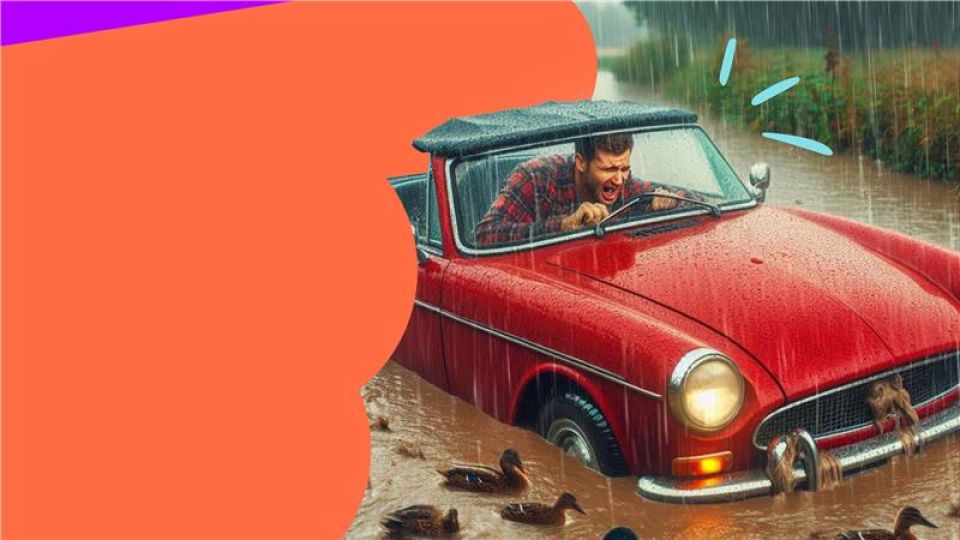In recent years, Latvia has seen unusually many violent storms, heavy rainfall, and even hailstorms carrying ice the size of one's fist. Experts predict climate change will bring more and more of these disasters to our region. Luckily, there is a silver lining! You can take action and protect yourself from potential damage. In this article, you'll find several practical tips to help you protect your movable and immovable property from natural disasters in the future.
As the Vice President of Balcia Reinis Bērzkalns shares: "The damage caused by such natural disasters to our homes, cars, and gardens is very unpleasant. The repair process is often time-consuming, filled with anxiety, and fairly expensive. And while there is no way to protect ourselves from potential damage entirely, there are several things we can do to help reduce the damage."
So what is it that you can do and where to start?
- Follow the weather forecast
Tip No.1 is to follow the weather forecasts as much as possible! This way you'll know if and when extreme weather is approaching and extra precautions are needed. Here's the best way to do it:
- Follow the Latvian Centre for Environmental Geology and Meteorology (LVGMC) social network profiles (Facebook, x.com, Instagram), where extreme weather warnings are published.
- Download the "112" app, which sends emergency notifications about potential hazards, including extreme weather. Within the app, you can also call for help and find out what to do in an emergency.
- Visit the LVGMC website once a week, and browse through their interactive warning map with up-to-date information.
- Things to do on sunny days
There are several preventative measures worth focusing on during the calmer days. These will take more time and may even involve experts, but are important if you want to significantly reduce the potential for damages caused by natural disasters on your property.
Property
- If you live in a house, make sure the roofing is intact and well-fixed, and the rain gutters are clean and will not prevent water from draining freely.
- Make sure the area around your home is well-drained to avoid flooding. If necessary, improve the drainage system.
- Regularly inspect the trees in your garden and cut branches that could break in strong winds. If necessary, call an arborist.
- Install lightning and surge protection devices to protect your home from lightning and power surges that can damage wiring, and electrical appliances and cause fires.
Solar panels
- Visually check that the solar panels are still firmly attached. If you suspect loose fixings, contact the company that installed the panels!
- If your solar panels are not made of toughened glass, which is more resistant to heavy rain and hail, contact experts about the possibility of installing a shield or net to absorb the impact of precipitation.
- Solar panels can also be struck by lightning, so it's recommended to equip them with lightning and surge protection. Otherwise, in the event of a lightning strike, the solar panels and inverters will be damaged. Make sure that the solar panels and their connections are properly earthed. Good quality earthing reduces the risk that lightning will cause damage to the electrical system. You may also consider temporarily disconnecting the solar panels from the mains.
- Make sure your home insurance covers damage to your solar panels caused by natural disasters, including hail, storms, and lightning!
- Things to do when a thunderstorm comes knocking
On the other hand, there are several things you can only prepare in real-time. If you know a storm is coming, here's what you can do to protect your movable and immovable property.
Cars and other motor vehicles
- If strong winds are predicted, make sure your car is not parked under trees or power lines! Even if the trees survive the storm, your car could be damaged by breaking branches, falling cones, etc. Additionally, beware of other objects nearby that could be thrown at your car in high winds.
- If possible, park your car under a carport, in the garage, or in a multi-story car park to protect it from rain, hail, and breaking trees.
- After heavy rainfall, do not drive in deep puddles or flooded areas. Doing so can damage or even destroy your car's engine, affect electronic devices and sensors, damage the braking system, and cause other serious damage.
- Check whether your CASCO car insurance covers all the above-mentioned risks caused by natural disasters. If not, consider buying insurance with a wider coverage.
Home
- Close windows and doors before storms and heavy rains, especially if your home has skylights! If they are not closed tightly, moisture can get inside and damage the window structure, window sills, walls, flooring, and electrical appliances near the windows.
- Unplug electrical appliances, as lightning strikes can build up induced currents in wires near the building and damage mains-connected appliances!
- Prepare for possible power outages – charge your mobile devices, and make sure you have enough drinking water!
- Switch off your home's main water and electricity sources to prevent emergencies during natural disasters!
- Check if your home insurance has an active subscription and includes compensation for natural disasters! Even if you take care of everything on your property, insurance will help you in case of third-party damages (as basic as your trampoline, barbecue, or tree falling on your neighbor's house or car).
If you've done everything successfully but still feel uneasy, take a peek at our insurance offer! Balcia offers wide coverage, the lowest number of exclusions on the market, and the option to buy and cancel at any time, at no extra cost! And if you're interested in technology and passionate about work in insurance, check out Balcia's open jobs in insurance!







